Are you interested in adopting a cow, but don’t have the space for a full sized one? Consider getting a miniature cow! These pint-sized versions of our bovine friends are not only super cute, they actually make great pets! Here, a Mt. Airy, MD vet offers tips on caring for small cows.
Basics
There are actually three categories of miniature cows. Midsize ones are between 42 and 48 inches high at the hip. Standard miniatures are a bit smaller, typically measuring about 36 to 42 inches. Then we have the micro-miniature cows, which are all smaller than 36 inches. Generally, these guys are between a third and a half the size of regular cows. (Note: cows are very social, and are happier with buddies. We recommend getting more than one.)
Benefits
There are definitely some great benefits to having smaller cows. If you get a milk cow, you’ll get enough milk to drink and make some butter and cheese, without having a lot of extra milk. You also don’t need a lot of space. An acre per cow is plenty! Little cows are also cheaper than their larger buddies, as they don’t need to eat as much. You’ll also find cleaning and hauling hay easier, as the amounts are smaller.
Shelter
Cows need fresh air, but they should never be left without shelter. Your bovine buddy should have, at the very least, a three-sided shelter to protect them from the elements. As for fencing, you may be happy to learn that cows really don’t need big fences. Just make sure that the fence is sturdy, so your cow doesn’t go through it or injure herself.
Veterinary Care
Like any other animal, Bessie will need regular examinations. She’ll also need vaccinations and parasite control. In between appointments, you’ll need to watch for signs of illness or injury. Ask your vet for more information.
Food
We recommend having your land checked, to see if it will make good pasturage. If it doesn’t pass muster, Bessie will need feed hay twice daily. Otherwise, you can just give her hay as a supplement. Your furry pal should always have access to fresh, clean water. Vitamin, mineral, and salt blocks should also be available at all times. Ask your vet for specific nutritional advice.
Do you have questions about cow care? Contact us, your Mt. Airy, MD vet clinic, today!
